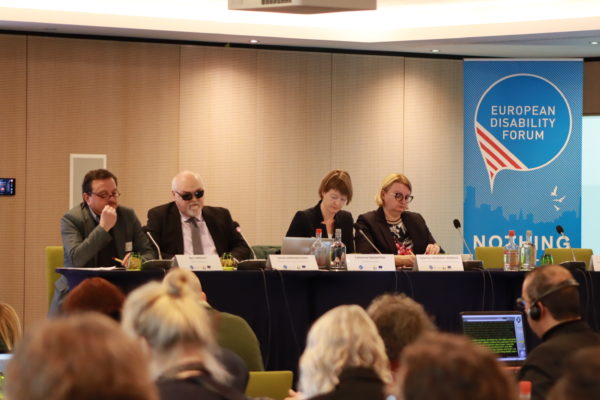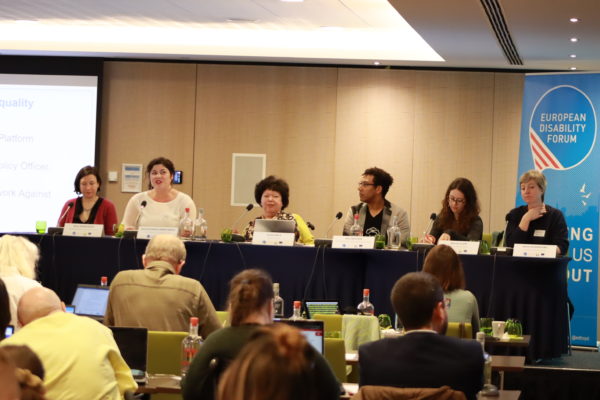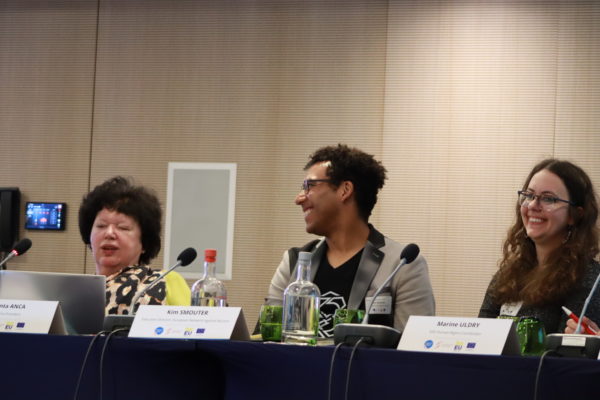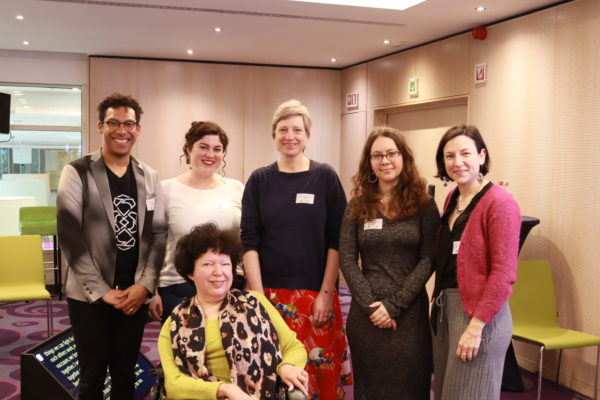The Conference “Towards a Union of Equality” took place on 16 March, bringing together representatives of equality networks to discuss a common equality agenda for the next EU legislative term. The conference, moderated by the European Disability Forum’s Vice President Gunta Anca, included representatives from Age Platform Europe, Equinet, the European Network Against Racism, the European Disability Forum and ILGA Europe.
The Conference was preceded by keynote speeches from:
- Bart Verdickt, Board member of the Belgian Disability Forum
- Yannis Vardakastanis, President of the European Disability Forum;
- Katarina Ivankovic-Knezevic, Director at the Directorate-General for Employment, European Commission.
Bart Verdickt opened the conference by celebrating the agreement on the European Disability Card and highlighting the importance of accessibility, mobility and the need for freedom of movement. He focused on the need to work at the European level for quality employment and full inclusion of persons with disabilities as EU Citizens.
Yannis Vardakastanis focused on the importance of the European Elections in garnering political will for an inclusive, equal future.
He strongly called for European leaders to take decisive actions on two urgent crises: climate change and ongoing war – the Russian war of aggression against Ukraine and the invasion of Gaza.
Yannis Vardakastanis called for an immediate ceasefire in Gaza and for the release of all hostages. He decried the EU’s lack of efforts to lasting peace in the region:
Europe, where are you? Europe should be a place that promotes peace.
Katarina Ivankovic-Knezevic started by highlighting the importance of supporting Ukraine and persons with disabilities displaced by the war – especially those still residing in segregated institutions. She highlighted the advances in disability rights during this term, including the European Disability Card and the Accessible EU Centre.
She announced that, for the first time ever, there will be a candidate for the UN Committee on the Rights of Persons with Disabilities – Inmaculada Placencia Porrero.
Panel: Towards a Union of Equality
Gunta Anca opened the panel by stating that “Equality in Europe needs to be one of the core issues of the upcoming Commission.”
Panellists for the Conference included:
- Nena Georgantzi, Human Rights Manager at AGE Platform Europe;
- Jone Elizondo-Urrestarazu, Senior Legal and Policy Officer at Equinet;
- Kim Smouter, Executive Director at European Network Against Racism;
- Marine Uldry, Human Rights Coordinator at the European Disability Forum
- Katrin Hugendubel, Advocacy Director at ILGA Europe.
Panellists then answered a series of questions regarding the advancement of equality issues.
Main achievements in recent years
The first question focused on the main achievements in equality in recent years.
Jone Elizondo-Urrestarazu underlined the reinforcement of equality directives and strategies, and addressing intersectional issues. She particularly welcomed legislation on binding standards for equality bodies.
Kim Smouter shared how the last years have been both of progress and regression. He underlined the antiracism action plan and nomination of policy coordinators following the Black Lives Matter movement. At the same time, double standards have emerged and been strengthened: disappointing reactions to the war in Gaza, discrimination during the Russian war of aggression against Ukraine, increased racial and antimuslim bias and more extremism in political parties. He stated that the European Elections will be a watershed moment, and there’s a need to ensure all our achievements will not be rolled back.
Current challenges
The second question focused on the current challenges and how to tackle them in the future.
Nena Georgantzi underlined that the Commission’s record on age discrimination has been extremely disappointing, as no specific initiatives have been taken on this issue.
Katrin Hugendubel explained trends that are affecting LGBTIQ+ rights. First, a more polarised and violent public discourse is leading to an increase in hate crimes and hate speech. This is compounded by countries moving to limit the rights of LGBTIQ+ persons through, for example, banning rights, not securing rights such as freedom of assembly, or limiting access to healthcare for trans people. In a positive trend, she mentioned that this trend was countered by a clear increase in political willingness to support LGBTI rights, as, for example, demonstrated through the strong support by countries to the EU’s launch of infringement against Hungary’s anti-LGBTI law. She finishes calling for an EU Commissioner with a strong mandate for Equality and Fundamental Rights in the next Commission.
Marine Uldry shared the issue that issues of equality are still being addressed by different services and Directorate-Generals, leading to a lack of intersectional approach. This also leads to internal pushback by services that are not tasked with dealing with equality issues, even if their initiatives impact marginalised communities. She listed three actions to develop EU Institutions’ effectiveness on intersectional issues: strengthening transparency in the EU Council’s decision-making, resourcing the Equality Taskforce, and increasing diversity among staff and political representatives working at the EU Institutions.
The Future
The last question focused on the future, asking panellists what they would like to see in the upcoming EU legislative term and how we can make equality a real thing.
Katrin Hugendubel started by stating, “My dream is that the European Commission is, just as we do, starts to engage in very specific actions tackling intersectional discrimination. She called for all equality grounds to be united in a strong and well-resourced DG Equality and Fundamental Rights, as well as for a strong coordination mechanism in the EC that will ensure cooperation and coordination between all EC services to advance key equality policy initiatives together.
Kim Smouter stated that equality networks should work more closely and advocated to pass from a Union of Equality to a Union of Equity. He also called for politicians who dare to stand up against discrimination without concern for their reputation. Finally, he asks for countries to take action when they witness something that goes against European values.
Nena Georgantzi focused on strong action against age discrimination, including by expanding legal protections outside the field of employment. She called for better training, exchanges and peer learning between services at the European Commission.
Jone Elizondo-Urrestarazu concurred on the need for legal frameworks going beyond employment to close legal gaps. She also focused on effective sanctions for non-compliance to equality principles. She calls for the European Commission to lead by example, having a more diverse workforce and using intersectionality as a core tool. We need to strengthen legal protection against the volatile and extremist right wing. It is essential to keep equality as a priority for the next Commission and make sure we have the support and resources to build on all our achievements from this term.
Marine Uldry focused on the need for a new Directorate-General for Equality and Fundamental Rights, a new Commissioner for Equality and Fundamental Rights, and an equality configuration in the Council. She also shared the need for the Equal Treatment Directive to finally be approved and for new strategies with an intersectional focus.
Interaction with the audience
Answering questions from the audience, panellists also raised the following points:
- Need for stronger cooperation and intersectional perspectives within the human rights movement.
- Need to promote resources from human rights organisations between them and their members.
- Need to identify and replicate good practices.
Notable quotes
Nena Georgantzi, representing AGE Platform Europe :
EU’s equality framework is running at different speeds. We still lack a strategy on age equality, just like we have for other grounds. This does not only adversely impact victims of age discrimination but also more generally the effectiveness of existing strategies to achieve a Union of Equality for all and at all ages.
Jone Elizondo-Urrestarazu, representing Equinet:
What has been achieved under this Commission’s tenure underscores the indispensable role of an Equality Commissioner and a European Commission committed to prioritizing equality. Despite progress, our journey continues, especially amidst the current volatile and extremist climate. It is imperative we strengthen our existing legal framework and ensure its implementation and enforcement. This requires robust enforcement mechanisms, with the implementation of Directives on Standards for Equality Bodies being essential. We must be resolute in opening infringement proceedings and imposing effective, deterrent sanctions for non-compliance.
Kim Smouter, representing the European Network Against Racism :
The Commission has enhanced its structures to combat inequalities appointing an Equality Commissioner and Coordinators entrusted to lead the fight against discriminations, alongside the adoption of landmark Action Plans to drive forward the agenda. However, much remains to be done to ensure that EU policies do not exacerbate the marginalization of certain groups and address people’s actual lived experiences by further embedding an intersectional approach. It is crucial to safeguard civil society organizations advocating for this change and representing individuals living with these intersections. To that end, ENAR has released its manifesto #EuropeForAll, endorsing courageous leadership and emphasizing essential components for achieving justice and equity in Europe.
Katrin Hugendubel, representing ILGA Europe:
The public discourse is becoming more polarised and violent, and as a result the LGBTI community has experienced the highest and most severe violence across Europe in decades. The very core values and standards upon which the EU was founded – respect for human dignity and human rights, freedom, democracy, equality and the rule of law – are being called into question and human rights, and in particular the human rights of LGBTI people, are facing a strong challenge from far-right forces. As we witness the rise of political forces that question basic fundamental rights and freedoms, it is a crucial time for the EU to hold fast to the core values upon which it was founded.
Conclusions
Catherine Naughton, Executive Director at EDF, reported on the panel’s conclusions, asserting that
Equality doesn’t exist in a vacuum; we don’t thrive when not everyone is thriving.
She announced the launch of the Joint Statement on “Building an inclusive European Union of Equality”.



